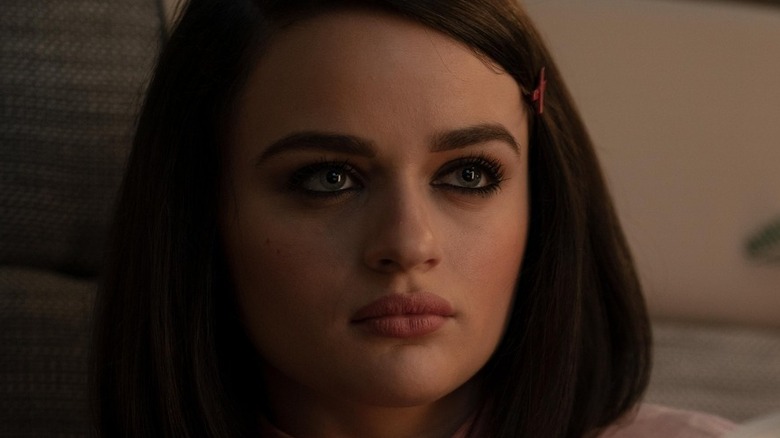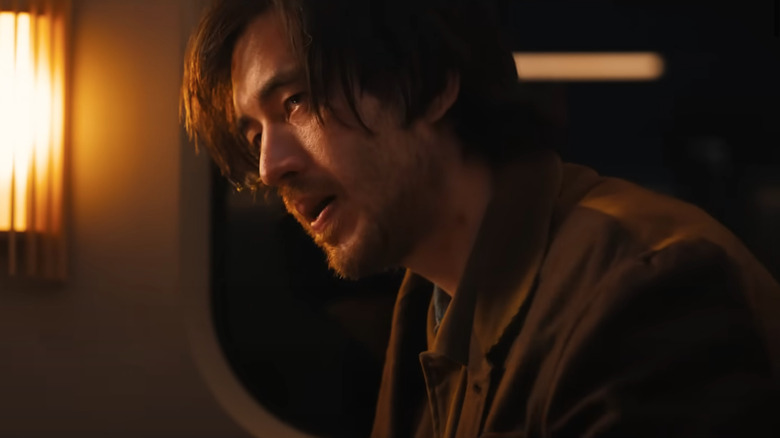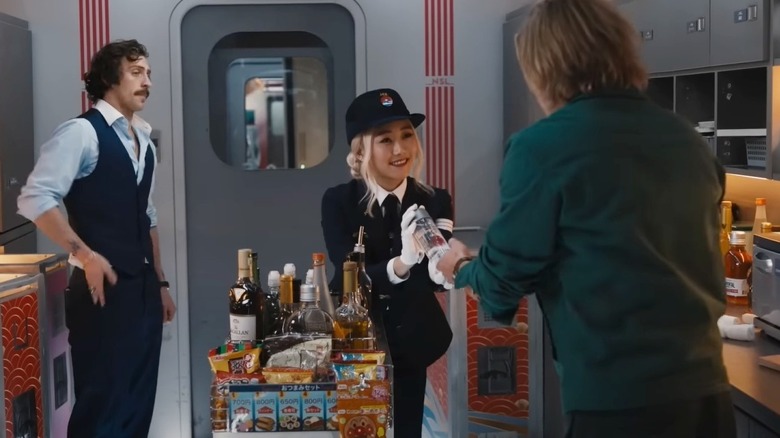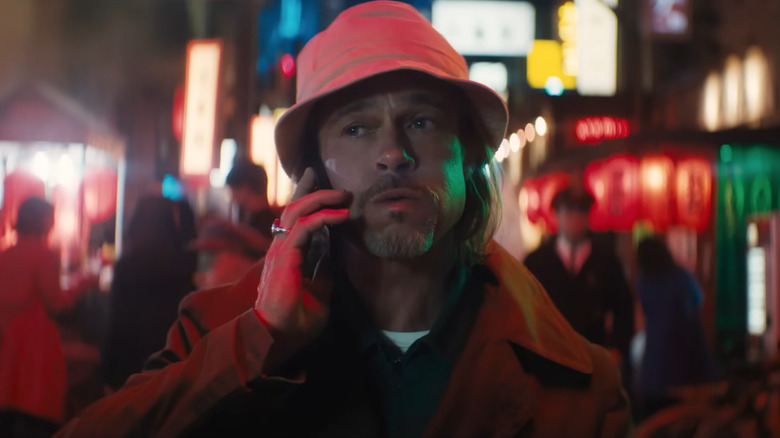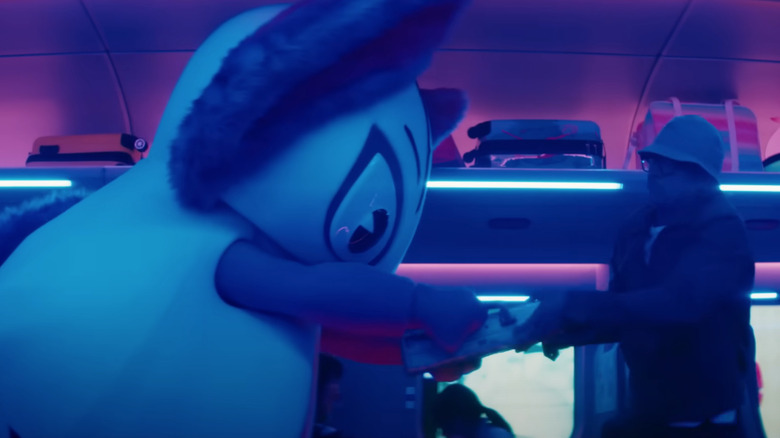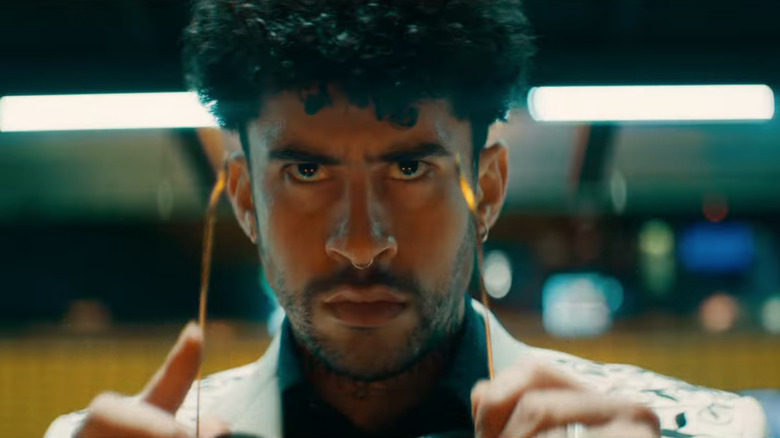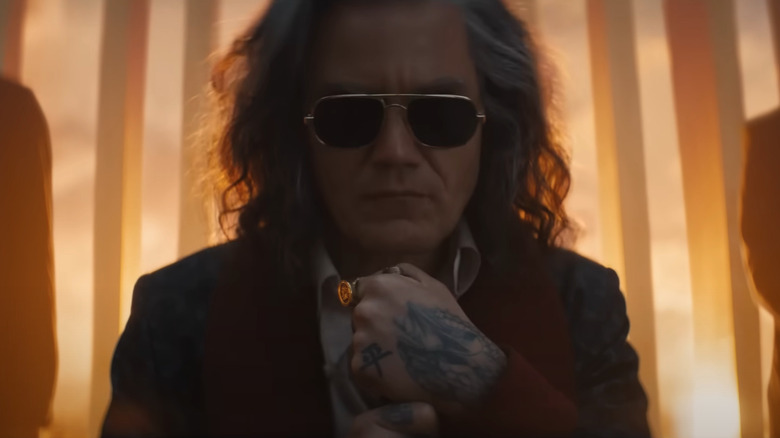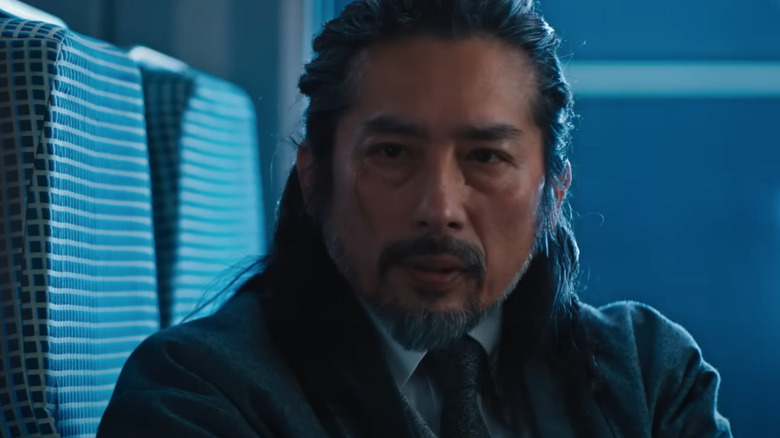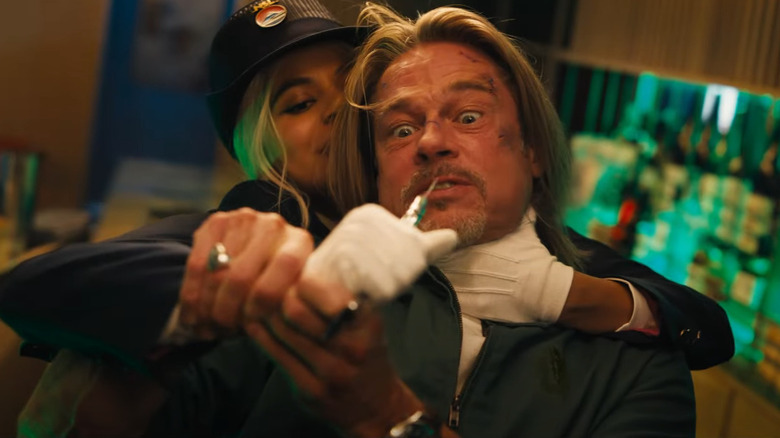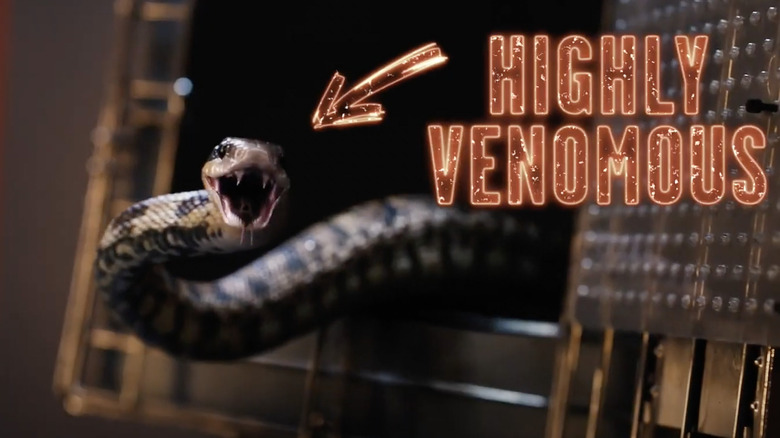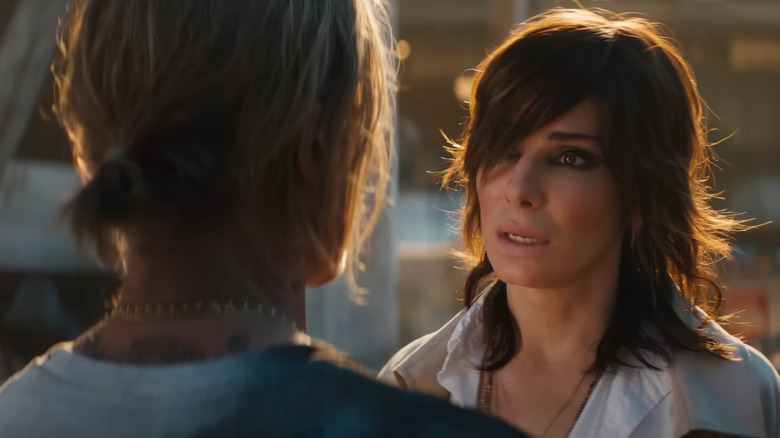Bullet Train Moments That Upset Fans The Most
From the get-go, there was no chance that the hyper-stylized, hyper-speed action movie "Bullet Train" was going to be anything but polarizing. Based on a book named "Maria Beetle" by Japanese author Kotaro Isaka, which itself is a winding, fast-moving story with many moving pieces, the film takes place on a bullet train on which a motley arrangement of assassins is out to kill one another. Then that story received its big-screen adaptation by director David Leitch, best known for frenzied action films such as "John Wick," "Atomic Blonde," and "Deadpool 2." Add in an A-list ensemble cast of main characters, a relentless commitment to style over (or at least right next to) substance, and a script that tries to juggle an inhuman amount of content, and you have a movie virtually guaranteed to elicit the words "best" or "worst," depending on the reviewer.
From start to finish, "Bullet Train" lives up to the promise of its premise, flying along at immeasurable speed, seeming to almost teleport from place to place, and constantly threatening to go off the rails (and it may very well have). No film can please everybody, but with such a frenetic dedication to chaos and style, the film was bound to leave some audience members wishing they'd got off a few stations ago. The ambitious action film has at least left audiences and critics alike with as many moments to hate as there are to love. Here are the worst of the former, the "Bullet Train" moments that upset fans the most.
The whole beginning drags
With a movie named "Bullet Train," especially one actually set on a train and one whose events are meant to mimic the setting's (literal) breakneck pace, it's a tough call whether or not pacing issues are ironic allusions to the super-speed train or just plain bad filmmaking. With almost every minute of the movie taking place on a train that's whipping along a Japanese rail at around 200 miles per hour, the fact that so many viewers find its first act to be so unbearably slow is indeed pretty ironic.
Official discussion threads on Reddit, for one, are chock-full of comments highlighting how sluggish the film's opening sequences are. Some, like user u/BathtubBobby, thought "It was a little slow to start, but it was just building"; u/RodJohnsonSays said that "The first 30/45 took a bit of setup, but once the movie started rolling it really found a very funny groove" were forgiving of the delay. But even among the more forgiving takes, the sheer number of them is telling. Whether it's a comment about "nonsense at the start," how the "beginning dragged a bit," or how "the first act is bogged down by a mountain of exposition," it's clear that this train took a little while to build up momentum.
Among the fans who thought the beginning drags? Video game titan Hideo Kojima, who tweeted that despite enjoying the picture on the whole, "I was not able to 'get into' the mysterious bullet train and its peculiar picture design and 'groove' until the middle of the movie."
Not enough Karen Fukuhara
Among any massive ensemble cast, it can be hard to stand out. Take recent movies from Wes Anderson, for example — "The Grand Budapest Hotel" is so star-studded that even the likes of Jeff Goldblum and Harvey Keitel struggle to take ownership of their scenes. "Bullet Train" has the same issue for some of its many actors, and one of the most unfortunate victims of this underutilization is Karen Fukuhara. Fukuhara has become a fan favorite for a few high-impact roles, most notably the mute Kimiko aka The Female in all four seasons of "The Boys." She had a rather inauspicious start in Hollywood, despite landing an ostensibly leading role, as Katana in the 2016 "Suicide Squad" — an equally underused, underdeveloped character. Sadly, Fukuhara's role in "Bullet Train" is similar, and in the film, she's far from the badass super-heroine she is best known for; instead, she's given a few minutes of screen time, almost no lines, and no real purpose for being there in the first place. Fukuhara plays a "concession girl" aboard the train and is therefore limited to pushing a cart full of snacks while silently nodding and smiling.
U/gunningIVglory observed in a discussion of the film on Reddit that her role is "very small, quite disappointed they didn't make more use of her. Not sure if she was tied up with The Boys, but they could have certainly done way more than they did." Another user, u/Tedmosbysson, said her part in the film is "Kind of blink and you'll miss it to be honest." Perhaps the criminal underuse of Fukuhara is best summed up by u/daiselol, who commented, "Still waiting for the day Karen Fukuhara gets a role that has lines."
Brad Pitt seems spaced out
As if "Bullet Train" needed any more fodder for fan debate, the movie's lead role — that of the aging, bumbling, chronically unlucky hired gun named Ladybug with a newfound allergy to negative feelings — is played by Brad Pitt. The Pittster has been at the top of the mountain for almost his entire career, soaking up awards for both his talent and statuesque jawline, but for every accolade he's received, Pitt has seemingly gotten a matching bit of criticism. In his career retrospective on the actor, Roger Ebert put it ever so diplomatically that at the start of his golden streak, "Pitt alternated critical and commercial darlings [...] with less beloved films." Scrolling through its reviews, "Bullet Train" has more than its share that prove Pitt's performance to be "less beloved."
Wendy Ide with The Guardian wrote, "'Bullet Train' is infuriatingly pleased with itself. And ground zero for this implosion of self-satisfaction is Pitt." Likewise, Slate wrote, "At a moment in his career when Pitt seems to be contemplating how to transition to a third act, it is to be hoped he will consider a different means of transportation next time." The criticism may not be Pitt's fault, as he is forced to portray a character who alternates between master assassin and senile space-case, which is sure to rub some viewers the wrong way — well-acted or not. Pitt's haters include some Twitter users, such as @danielleloucamp, who fervently denied that "Bullet Train" was "Brad Pitt at his absolute best." On Reddit, u/Fly-by-69 said Pitt was miscast and clearly "having a pretty rough time. This was not the script for him."
Everything but Brad Pitt
As you would expect, a huge portion of the reviews for "Bullet Train" mention Brad Pitt's performance in the leading role of Ladybug. Perhaps less expected, however, is how evenly split those Pitt references are between trashing him and praising him. U/bhison said, "Brad Pitt was amazing," while u/MattStone1916 said, "Pitt is the standout of this talented cast." Fans of Pitt and his character work are vocal and numerous.
Some of the film's fans, though, seem to praise Pitt as being the best element amid an otherwise lacking production. IndieWire critic David Ehrlich tweeted that despite not liking the film, he thought Pitt's movie star presence "shines even brighter in the bad ones," and critic Matt Neglia also tweeted that the tone, characters, and silly jokes caused a bit of a disconnect for him, while the "bloody action led by Brad Pitt's goofy reformed assassin" and the rest of the cast was a highlight. In a review, Wenlei Ma of News.com.au wrote that the movie "rolls along on the power of Brad Pitt's megawatt charisma — and sometimes on that alone." Rebecca Harrison of Sight & Sound praised "Pitt's camp performance" as one of the highlights of an otherwise braindead film, though perhaps Anthony Lane of The New Yorker said it best: "The only soul to emerge with any credit from 'Bullet Train' is Brad Pitt, who drifts through the tumult in a haze of unbothered charm."
Ripping off Tarantino
On Reddit, some users criticized the film for seemingly aping Quentin Tarantino and Guy Ritchie's style and snark. U/popgeist_official said it seemed like the latest in a long line of "Pulp Fiction" imitators, voicing the same bugbear that a huge amount of viewers have. U/monstera-delicious similarly alleged that the film was copying Tarantino, as did u/mark_lenders, who said, "Useless fight scenes, random music to try to look cool, a poor excuse for a story [...] It looked like someone copying Tarantino/Guy Ritchie's copies without understanding what made the originals good." Even fans on Twitter like writer David Milner and actor Mari Takahashi said it has "big Guy Ritchie and Tarantino vibes, almost too much so in fact" and feels like "if Guy Ritchie and Tarantino had a baby."
We here at Looper also noticed the same connection "Bullet Train" has to Tarantino's style. Critics agreed. Mark Feeney of The Boston Globe called the movie "your basic sub-Tarantino stylized nastiness" and A.A. Dowd writes with Digital Trends that "Leitch has given three decades and counting of Tarantino worship its hugest stage yet." It can be tough to pin down exactly what makes "Bullet Train" such an obvious attempt at the style of Tarantino films such as "Kill Bill" and "Reservoir Dogs" — the obvious samurai and gangster film homages, the reliance on quips and rapid-fire pop-culture gags, the mix of bloody violence and snarky, quirky characters, people's propensity to monologue between bullet sprays ... more than a few fans took umbrage with the supposed style-over-substance tactic that David Leitch took with "Bullet Train."
All the exposition dumps
On top of "Bullet Train" potentially bogging itself down with an oversized and underutilized ensemble cast, many fans objected to the way in which each one was given their own backstory sequences. These backstories can be funny, building up characters and their quirks only to subvert expectations by killing them off immediately and unexpectedly. Not only do these numerous, lengthy asides go against one of the cardinal rules of succinct storytelling (as Kurt Vonnegut put it, "Start as close to the end as possible"), but they also take an exorbitant amount of screen time away from the actual events of the story — the bullets and the train.
U/MattStone1916 called it "a mountain of exposition, which is both vomited out and agonizingly long-winded" and added the question, "Why does every ensemble film need Suicide Squad-style graphics spelling out character introductions?" On Twitter, Liam Donovan used the exact same phrase in their critique, calling out "the mountain of exposition needed to prop up what should be a fairly straightforward premise." Another Twitter user, Ryan Oquiza, said, "Once all the moving parts settle down and the exposition dumps slow down, it's a smooth ride." The lengthy asides and hefty bits of exposition sometimes work for comedic effect — like one story of a water bottle, of all things, near the climax — but can seem ultimately useless, especially when it comes to characters like the Wolf (Bad Bunny aka Benito Antonio Martínez Ocasio), who only spends a few minutes of the film alive.
The (lack of) action scenes
There is at least one universal truth to action movies on which all fans can agree: They need a sizable share of action. Unfortunately for many fans of "Bullet Train," the movie didn't pay off on its setup nearly enough, with action scenes that both literally and metaphorically pulled their punches and then cut away too early.
The Hollywood Reporter put it as eloquently as ever when they described the movie as "a thrill-free thrill ride," and many fans agree. On Reddit, u/Reekshavok312 complained that they "wished the fight sequences were longer, majority of them lasted seconds and were all shown in the trailer [...] Everything time there was a big moment or decent action scene, the movie cut to another scene or showed it via a 30second flashback." and other users agreed that the fights seemed poorly shot and "useless."
Furthermore, actors who've killed it in action roles before, like Karen Fukuhara and "Warrior" star Andrew Koji, don't get any action scenes at all. "I am a little sad we [didn't] see andrew koji in a martial arts fight," said u/geraldho. That is one of the biggest gambles that David Leitch takes with "Bullet Train," trying to amp up the pace with quick cuts and decisive editing. According to some upset fans, those choices may have actually dulled the movie by taking away from what could have been stellar fight sequences.
The Hornet's death
Many moments in "Bullet Train" that upset fans the most come from characters or scenes not receiving enough time, attention, or development, and the assassin known as the Hornet is no exception. In the eyes of many fans, neither the Hornet, nor her actress Zazie Beetz, were given nearly enough of the "Bullet Train" pie.
On Reddit, u/ilovepaninis wrote that "Characters get introduced and killed immediately, or with the Hornet f.e. you don't get to bond with the character because [...] she dies right after being revealed." Others called the character "wasted/terrible," and u/apathymonger said, "I was surprised to see after that Zazie Beetz was on the poster, she's a cameo who's in the movie for maybe three minutes?" Our friends at SlashFilm agreed, writing that one of the worst moments in "Bullet Train" is when it wastes the Hornet and Beetz.
The sheer amount of characters introduced in the movie, when combined with how quickly it cuts back and forth between scenes and tones, makes the underuse of the Hornet just one example of a much larger trend. As Peter Debruge with Variety summed it up, "Neither the characters nor the film they inhabit are particularly deep."
The boomslang snake
When it comes to "Bullet Train," probably the smallest nit that multiple fans picked comes in the form of the boomslang. The snake plays a consistent role in the movie, popping up throughout to thwart various characters — first mentioned in a news report, then getting a shoutout for its dangerous venom, which is used to kill two characters, and finally showing up a few times after it escapes. It even bites Ladybug, who had a serendipitous dose of antivenin earlier and survives the encounter. But while you might think the details of its biology may not matter to the movie or its fans, you would be wrong — and they may just have a good point.
In "Bullet Train," the boomslang is repeatedly cited as having the fastest-acting venom of any snake, making its use for assassinations as feasible as it is brutal. The problem with the movie's claim, however, is that real-life boomslangs are known for the exact opposite trait. As u/SciFiXhi pointed out, they "wish they had chosen a different kind of snake. Boomslang venom is notoriously slow-acting in humans, killing on a scale of days rather than seconds like in the film." And they are right. Boomslang venom is so slow-acting that one unfortunate scientist bitten by the snake was able to write an entire journal about his symptoms as they gradually appeared — all the way until they finally killed him. It does, however, have "the ability to make the victim bleed from every possible orifice," just like in the film.
Needless cameos
In r/movies, u/Lamethrower posed an excellent question, not just about "Bullet Train," but about modern movies in general: "Can anyone help me figure out the difference between a surprise cameo and a joke without a setup? [...] Are we meant to laugh at the fact we saw a famous face for 3 seconds? They literally had zero lines. It's just 'hey it's that guy from that thing.'" The point is a valid one, and "Bullet Train" forces viewers to ask themselves that several times over.
Depending on where you draw the line between cameo and supporting role, "Bullet Train" has anywhere from three to seven cameos by major actors, some of them as short as a few seconds long. Some, like Bad Bunny as the Wolf, Zazie Beetz as the Hornet, and Michael Shannon as the White Death, are at least given fight scenes with the main characters. Logan Lerman plays White Death's son, but he gets the "Murder on the Orient Express" shock death that kicks off some of the plot. Others, like Channing Tatum, Ryan Reynolds, and Sandra Bullock, seem thrown in for the sole purpose of a quick, easy moment of fun. For any fan of an actor who learns that they're scheduled to show up in a movie, especially an ensemble piece like "Bullet Train," it's fair to be upset over a cameo that lasts mere moments.
